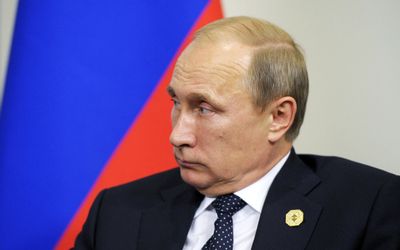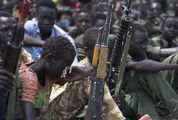No new Cold War with Russia; only a test of will
by Philip Stephens,
2014-11-17 05:44:14.0
MIKHAIL Gorbachev warns that the world risks a reprise of the Cold War between Russia and the West. He is mistaken. The Cold War was a global contest between two political and economic systems. In 1989 communism lost. There is no going back.
Vladimir Putin’s Russia does not have an alternative ideology to sell. His authoritarian style has its admirers but, truth be told, there is not much of a market elsewhere in the world for Moscow’s economic and political model.
Gorbachev’s lament is for what might have been. It measures the crisis in Russia’s relationship with the West against the partnership of equals he hoped would emerge from the ashes of Soviet communism. But things went wrong when the US and Europe invited former communist states into the North Atlantic Treaty Organisation and thus humiliated Russia during its moment of weakness.
Gorbachev never quite explains how freedom for the nations escaping Soviet tutelage could have been reconciled with the preservation of a Russian sphere of influence. Poland was to be set free to make its own choices or it wasn’t. The same could be said of Ukraine. Putin does not even try to square this circle. He has always seen foreign policy as a zero sum game. As a young adviser to the mayor of St Petersburg during the early 1990s he was already bridling against the Soviet collapse. He later called it the geopolitical catastrophe of the 20th century. In Putin’s mind, for Russia to win, someone else has to lose.
All this said, there are Cold War lessons that can be relearnt in response to Putin’s revanchism. The first is patience; the second is resolve. Together they add up to deterrence. Anyone who thinks the conflict in Ukraine is susceptible to a quick diplomatic fix is deluding themselves; likewise, those who imagine that appeasement will lead Moscow to compromise. Putin respects only those ready to stand up to him.
During the 1980s Kremlinologists speculated that the Soviet economic system would one day collapse under the weight of its contradictions. As they had no idea when this might happen, however, they assumed it would endure indefinitely. The strategy demanded patience. The same is true now of a well-judged response to Russia’s military adventurism. Putin is settling in for the long haul. The West should do the same. Moscow has recognised sham elections held by pro-Russian separatists in Donetsk and Lugansk. The ceasefire has badly frayed, and monitors from the Organisation for Security and Co-operation in Europe have recorded a new influx of Russian troops and heavy weapons. As happened in the Georgian provinces of Abkhazia and South Ossetia in 2008, Russia is establishing a frozen conflict.
Western sanctions are unlikely to change the calculus any time soon. Along with the falling oil price, sanctions have inflicted damage on the Russian economy. Growth has stalled, capital flight has increased and foreign investment has shrunk. The rouble has taken a battering. But Putin has money in the (central) bank, control over the oligarchs and strong popular support for his nationalist pose.
He expects the West to blink first. Given the hesitation among some Europeans, this is not a bad bet. Italian Prime Minister Matteo Renzi has told Germany’s Angela Merkel he speaks for "half of Europe’s governments" in calling for diluted sanctions. Counting Malta and Cyprus, he may be right.
This is where resolve comes in. At the ceremony marking the 25th anniversary of the fall of the Berlin Wall, Merkel said the message was that "dreams can come true … nothing has to stay as it is, no matter how high the hurdles". Stirring stuff — but true only if political leaders combine patience with resolve.
Sanctions can change the thinking in Moscow only if it is convinced the West will not flinch. Why should Russia concede anything if it seems Renzi rather than Merkel will carry the day? Yet if sanctions come to describe the new normal in the West’s relationship with Russia, Putin may have pause for thought.
The purpose is not another Cold War. The facts of geopolitics demand that the West continue to do business with Putin not least in negotiating with Iran about its nuclear programme, and in combatting violent Sunni extremism in Iraq and Syria. But nor should the US and Europe give up on their values. Didn’t Gorbachev promise that the end of the Soviet empire would deliver freedom and democracy?
© 2014 The Financial Times Limited

Russia's President Vladimir Putin at the G20 summit in Brisbane. Picture: REUTERS
MIKHAIL Gorbachev warns that the world risks a reprise of the Cold War between Russia and the West. He is mistaken. The Cold War was a global contest between two political and economic systems. In 1989 communism lost. There is no going back.
Vladimir Putin’s Russia does not have an alternative ideology to sell. His authoritarian style has its admirers but, truth be told, there is not much of a market elsewhere in the world for Moscow’s economic and political model.
Gorbachev’s lament is for what might have been. It measures the crisis in Russia’s relationship with the West against the partnership of equals he hoped would emerge from the ashes of Soviet communism. But things went wrong when the US and Europe invited former communist states into the North Atlantic Treaty Organisation and thus humiliated Russia during its moment of weakness.
Gorbachev never quite explains how freedom for the nations escaping Soviet tutelage could have been reconciled with the preservation of a Russian sphere of influence. Poland was to be set free to make its own choices or it wasn’t. The same could be said of Ukraine. Putin does not even try to square this circle. He has always seen foreign policy as a zero sum game. As a young adviser to the mayor of St Petersburg during the early 1990s he was already bridling against the Soviet collapse. He later called it the geopolitical catastrophe of the 20th century. In Putin’s mind, for Russia to win, someone else has to lose.
All this said, there are Cold War lessons that can be relearnt in response to Putin’s revanchism. The first is patience; the second is resolve. Together they add up to deterrence. Anyone who thinks the conflict in Ukraine is susceptible to a quick diplomatic fix is deluding themselves; likewise, those who imagine that appeasement will lead Moscow to compromise. Putin respects only those ready to stand up to him.
During the 1980s Kremlinologists speculated that the Soviet economic system would one day collapse under the weight of its contradictions. As they had no idea when this might happen, however, they assumed it would endure indefinitely. The strategy demanded patience. The same is true now of a well-judged response to Russia’s military adventurism. Putin is settling in for the long haul. The West should do the same. Moscow has recognised sham elections held by pro-Russian separatists in Donetsk and Lugansk. The ceasefire has badly frayed, and monitors from the Organisation for Security and Co-operation in Europe have recorded a new influx of Russian troops and heavy weapons. As happened in the Georgian provinces of Abkhazia and South Ossetia in 2008, Russia is establishing a frozen conflict.
Western sanctions are unlikely to change the calculus any time soon. Along with the falling oil price, sanctions have inflicted damage on the Russian economy. Growth has stalled, capital flight has increased and foreign investment has shrunk. The rouble has taken a battering. But Putin has money in the (central) bank, control over the oligarchs and strong popular support for his nationalist pose.
He expects the West to blink first. Given the hesitation among some Europeans, this is not a bad bet. Italian Prime Minister Matteo Renzi has told Germany’s Angela Merkel he speaks for "half of Europe’s governments" in calling for diluted sanctions. Counting Malta and Cyprus, he may be right.
This is where resolve comes in. At the ceremony marking the 25th anniversary of the fall of the Berlin Wall, Merkel said the message was that "dreams can come true … nothing has to stay as it is, no matter how high the hurdles". Stirring stuff — but true only if political leaders combine patience with resolve.
Sanctions can change the thinking in Moscow only if it is convinced the West will not flinch. Why should Russia concede anything if it seems Renzi rather than Merkel will carry the day? Yet if sanctions come to describe the new normal in the West’s relationship with Russia, Putin may have pause for thought.
The purpose is not another Cold War. The facts of geopolitics demand that the West continue to do business with Putin not least in negotiating with Iran about its nuclear programme, and in combatting violent Sunni extremism in Iraq and Syria. But nor should the US and Europe give up on their values. Didn’t Gorbachev promise that the end of the Soviet empire would deliver freedom and democracy?
© 2014 The Financial Times Limited




























Post a comment